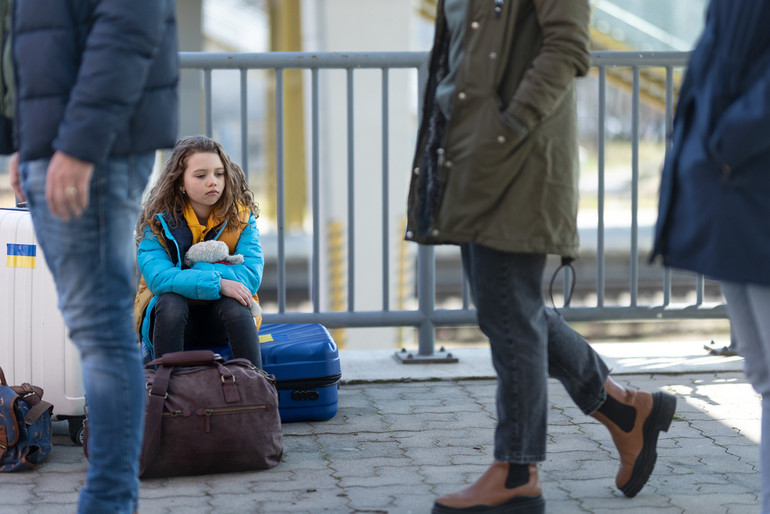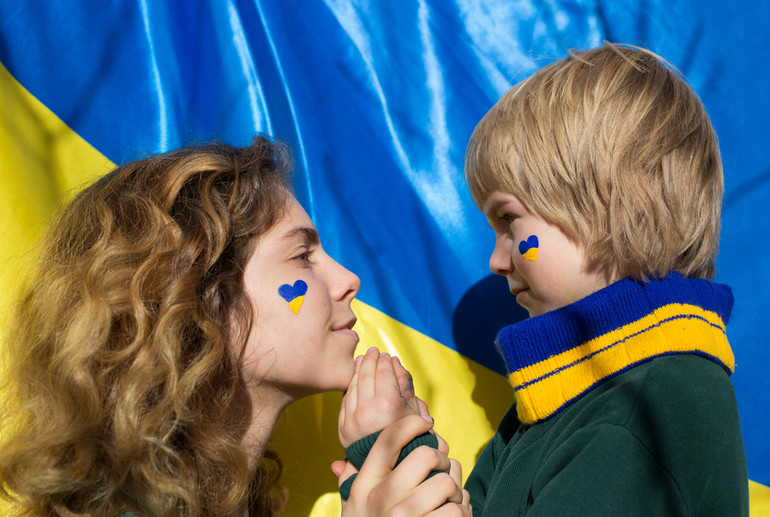For thousands of families, a full-scale war destroyed the classic idea of a family with mom and dad by their side. The situation, when a Ukrainian child grows up with one of the parents every day, is becoming the new norm. These are striking changes for which neither adults nor children are yet ready.
How to talk about it and how much children need the classic “dad, mom, me” scheme – “UP. Life” was told by a psychologist from the “Voices of Children” charitable foundation Yulia Sakharova.
Changes in family patterns caused by war
As a result of the full-scale war, the classic patterns of behavior in the family changed. There are still no studies on a new psychological portrait of a child or a family in Ukraine, so at the moment we are talking about tangible examples from different experiences of Ukrainian families.
For example, a family can be complete, but not always together:
Dad works, mom is at home – takes care of the children, the household, and can still work. Or mother serves.
Dad stayed in Ukraine, mom and her children went abroad because of the war to be safe.
One of the parents took the child to greater safety, the other stayed to look after elderly relatives who refuse to leave the front line or temporary occupation.
A number of families cannot withstand the test of war, stress, distance, and separate. Ukrainian families also lose loved ones because of the war. If parents die, children can get guardians. How to explain these changes in family forms to them?
When one of the parents is nearby, the other is at the front
Currently, in most cases, it is about the mother, who is forced to be responsible for everything that was previously shared between the two. The family is complete, with mom and dad, but with the correction that there is distance and anxiety between them.
Such conditions become traumatic for the child.
“She can become anxious, isolate herself, worry. Various conditions can manifest: sadness, hysteria, aggression. The child feels the mother’s condition, worries.” Yulia Sakharova explains.
How to talk with a child about why the family now has to live separately? The expert advises to tell the truth, taking into account age characteristics.
“The least you can say is that dad is at war, defending Ukraine. Elders can ask clarifying questions, demand more information. Here it is important to answer sincerely and calmly, to try to convey the values of the family, for which mom or dad is at war.
It is also worth talking about positive moments, for example, planning joint leisure time when dad or mom will come home for a few days. To explain that temporarily this is how we are, but later it will be different”– advises the specialist.
Tell children the truth, but pay attention to age characteristics, says the psychologist.
Фото: halfpoint/depositphotos
If the parents are worried, don’t know how to respond, or the topic is sensitive and they can’t continue with it, it’s worth saying that too. There is no need to invent anything. Talk about your emotions and when you can return to this conversation, advises Sakharova:
“A child is oriented towards an adult, and its emotional state depends on him. Therefore, if mom talks about dad, or vice versa, if there is an opportunity to call, talk, maintain this emotional connection, then it is of great importance for the child in upbringing.”
When one of the parents remained in the occupied territory
Such cases are not surprising: the child leaves with the mother, and the father remains, for example, to take care of a bedridden grandmother or grandfather who refuses to leave his native home. There may be other reasons, but the bottom line is that the family is divided.
Yulia Sakharova says that in such a situation, the child may experience anxiety, which over time develops into various neurotic states:
“The child is suffering. Perhaps there are children who have a creative adaptation to this reality. But I have not seen such. Of course, the child’s psyche is flexible, so it can recover. If we receive a positive experience, it is as if we rewire it, but that’s what what you need to work for a long time”.
In this case, the child should also tell the truth, talk about his sadness and worries:
“You can say that this is temporary, that we are waiting for dad. You can create a gift together with the child for dad, grandmother or grandfather, who are currently in occupation, to help the child live the emotions of separation, because they are equated with the feeling of loss. Therefore, it is important to talk about it with the child, being close, doing something together, reminiscing, looking at photos, etc.”
When the family lives in different countries
In all cases when dad or mom can’t be around, the child can have problems with attachment, not understand the models of a complete family, feel a lack of emotional closeness.
A child can receive warmth and care from another emotionally close person – for example, a grandmother. However, in adulthood, such a traumatic experience has its consequences.
“If a child compares himself with others who have a dad around, but she doesn’t, you have to explain that it’s difficult now, but we’re going through it together. Life changes. Despite the distance, our dad takes care of us.” – this is how Yulia Sakharova advises to explain such a situation.
You can tell that dad stayed at home because of the war, and it is better for the child to spend some time abroad – it is safer. In order not to lose emotional closeness, the specialist suggests communicating more often through video communication and even playing board games that way.

In cases where dad or mom can’t be around, the child may not understand the models of a complete family.
Фото: halfpoint/depositphotos
When during the war, mom and dad get divorced
During the full-scale war, the Ukrainians began break up more often. That is, there is a mother and a father, but they are no longer together.
“In such a case, the child feels that he is either to blame or can change something. That is, it becomes as if an adult, it can take on such a role. Stand up for mom or dad, or take someone’s side. This is also an emotional burden, also a trauma.” – explains the psychologist.
Such changes should be explained to the child using simple examples that would be understandable given his age:
“You can tell a small child about bees. For example: they can change their homes, fly from hive to hive. So can adults – they may not match in character, live separately, get divorced. But parents still love their child, mom and dad will be there , will educate and love”.
When mom or dad is gone
If there is a loss of mom or dad in the family due to illness, accident, death at the front or other reasons, everything suddenly changes for the child. The psychologist advises talking about this trauma:
“You need to talk to the child. Usually, children understand a lot of things themselves and realize everything. They are small adults. It is as if a person loses a part of himself internally when one of his parents dies. And he continues to live with this. Relatives remain nearby, the child continues to focus on them Later, he can meet an adult on whom he will rely.
A child learns to experience emotions through adults, so he must understand that we are sad, and cry, and angry, and annoyed – that all these emotions exist. The specialist advises to explain to children all their manifestations of emotions. You should speak honestly with the child and directly say that mom/dad is dead. And be there with support.
It is also important to ask a loved one who is more emotionally stable to talk to the child. These can be godparents, for example.

The psychologist advises to explain to children all their manifestations of emotions.
Photo: IgorVetushko/depositphotos
When parents are replaced by guardians
Yulia Sakharova explains that such children usually understand why they are not in their usual family. For example, because of the behavior of parents. Or something happened to them and they can no longer be around.
In this variant, it is about a complete change of the usual conditions, concepts that were associated with the concept of family in the child – she has to readjust and experience the fear of abandonment, in some cases it may even be a developmental trauma.
“This is a new family, new rules, everything starts anew for the child. She becomes more attached to the guardians, because there is a great fear of being abandoned. So the child tries to be within the framework, to follow all the rules. And this is again about trauma, when she may not understand her emotions, lag behind in psychological development, have difficulties in learning”– says Sakharova and adds that in this case it is worth contacting a child psychologist.
Mom, me, a cat and a parrot – how to explain to a child what a family is
First of all, you should talk honestly, sometimes to the smallest detail, emphasizes the psychologist:
“Children need to understand that different types of families are not a reason for discrimination. The main thing is that every child feels safe. You can conditionally explain that your family is mom, a cat and you, or dad, a dog and you, a parrot and you. In general, children are okay with it.”
A safe adult, a safe space, a safe atmosphere is what a child needs in order to accept the model of his family. She should communicate with her peers, go to clubs, school or kindergarten.
“The child should go with you to the movies, the theater, on walks, excursions, organize evenings in the kitchen, create something from scraps. Live with her her childhood, be close to her. Create such a close emotional connection that the child feels that this is her family: a cat, mother, her and a parrot, for example”– emphasizes the expert.
It often happens that children themselves begin to ask about the composition of their family – because an awareness comes, which in turn depends on the dynamics of growth and development.
In educational institutions, Sakharova suggests holding educational hours dedicated to the topic of family, and not only talking about the classic concept of giving birth, but asking to bring a photo of those whom the child considers his family. The psychologist also advises children who have lost someone close to them to speak in school groups.
“The teacher can say directly: “I’m sorry that this happened. Well done, that’s how you handle it. I admire your strength.”
It is traumatizing and children seem to feel a loss of control. It is important to make the child responsible for something, so that the sense of control can be returned to him and he can see the future and restore his inner senses.” – recommends Sakharova.
Such children can be united during games, while teachers should choose such games that would allow the child to open up, communicate, gain new experience of positive emotions.

A safe adult, a safe space, a safe atmosphere is what a child needs in order to accept the model of his family.
“Are you growing up without a dad? It is visible!“
Sometimes in disputes, children and adults unwittingly cross the ethical line with similar statements, which can further traumatize the child. If such cases are repeated, then, Sakharova says, it is necessary to talk about bullying and teach the child to resist it:
“You can teach a child to be confident, to feel his boundaries, to answer: “This is my family, I am proud of it. I hate that you say that. I’m asking you to stop and stop saying that.” Or turn to an adult and tell about the insult.”
Children need to be taught to turn to an adult, to develop leadership qualities and the ability to stand up for themselves, to stop aggression and bullying. And if others see it, to explain so that they don’t keep silent and stop it.
Of course, the family has a direct influence on upbringing, the formation of a child’s personality and his ability to adapt. A child in a family explores manners, habits, traditions, and values. The style of her communication and behavior is from there.
From mom and dad, the child learns behavior patterns that he later transfers to adulthood and his family: the child sees how dad and mom behave, how they communicate, show emotions, react to problems, etc., and thus gains experience in interaction between people.
But the importance of a child’s perception of the role of a man and a woman in the family is determined individually, therefore social objections that a man must be present in the family to raise a boy, and a mother must be present for a girl, are definitely exaggerated.
Victoria Shvetsespecially for “UP. Life”
